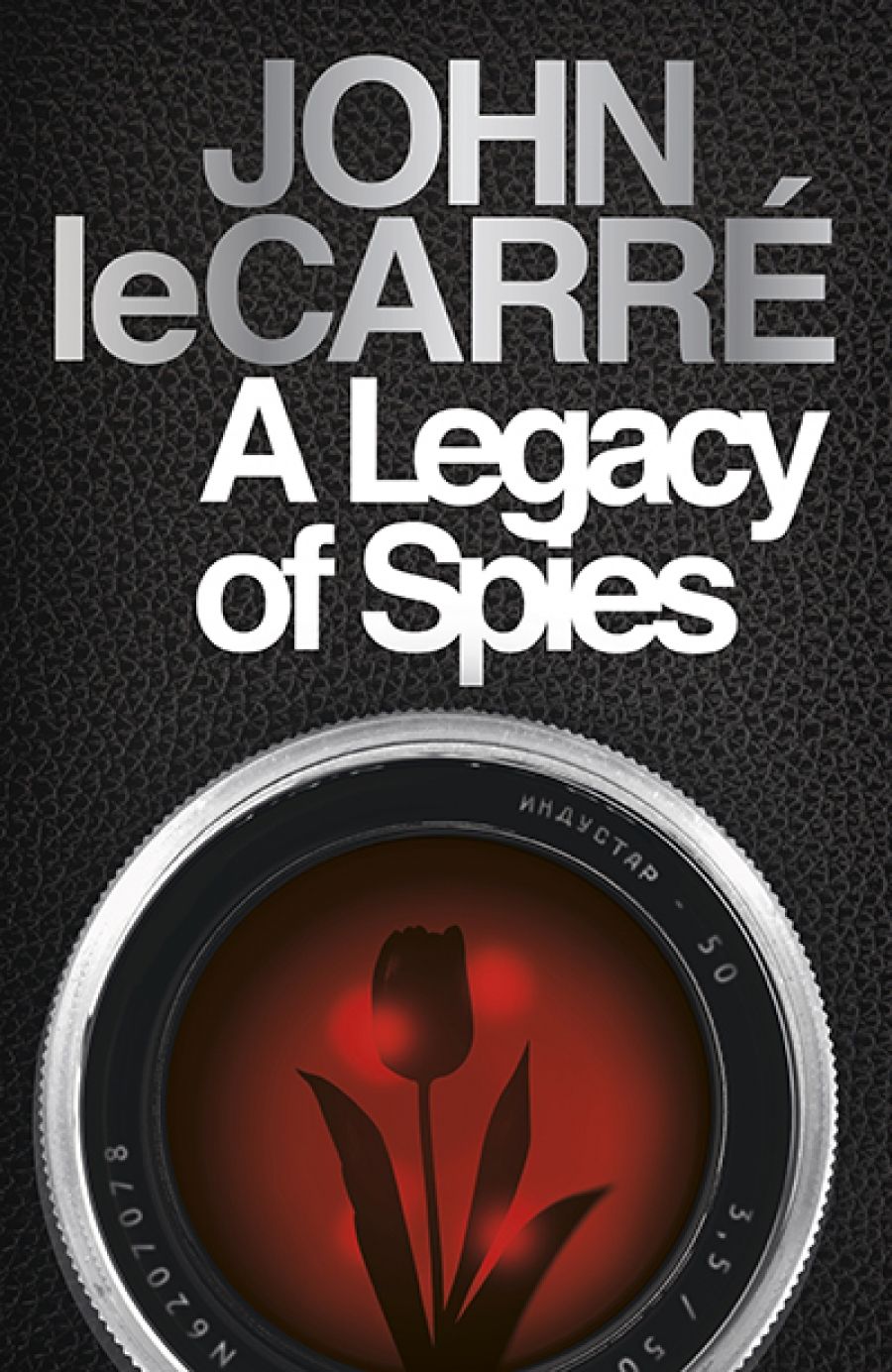
- Free Article: No
- Contents Category: Fiction
- Custom Article Title: Simon Caterson reviews 'A Legacy of Spies' by John le Carré
- Review Article: Yes
- Online Only: No
- Custom Highlight Text:
Sherlock Holmes, fairly early on in his career, survived an attempt by Arthur Conan Doyle to kill off the character in ‘The Adventure of the Final Problem’. Although Conan Doyle had wanted to dispense with Holmes and write about something else, he bowed to the pressure to continue the great detective’s adventures that ...
- Book 1 Title: A Legacy of Spies
- Book 1 Biblio: Viking, $32.99 pb, 320 pp, 9780241308554
From what we are told of Smiley’s life in the novels, Smiley, if he were alive today, would be well over 100 years old. Smiley last appeared in The Secret Pilgrim (1990), in which he is remembered as the mentor to the main character Ned, a nostalgic old-school spy who recalls the glory days of Cold War espionage, reminiscences prompted by the sudden collapse of the Soviet Union.
In A Legacy of Spies, Smiley’s status as a legend of espionage is conjured once more in connection with a Cold War cold case involving his one-time protégé Peter Guillam, who himself must now be well into old age. The case relates to the characters and situations depicted in The Spy Who Came in from the Cold (1963), specifically the British agent Alec Leamas who was sent by Smiley and his boss Control into East Germany on a doomed mission to protect a British double agent threatened with exposure. That mission achieved its strategic objective, although both Leamas and his lover Liz Gold were fatally shot by the Stasi as they tried to escape back to the West by climbing over the Berlin Wall.
Now, long after the Berlin Wall has been demolished, it seems Leamas’s son Christoph and Gold’s daughter Karen want to find out the truth about their parents’ deaths and are prepared to take embarrassing legal action. The current leadership at British Intelligence sees value in helping them gain access to files and witnesses long kept secret, a cynical move that, apart from anything else, might help to deflect public scrutiny of their shadier activities.
As someone with an intimate knowledge of Operation Windfall the codename given to the mission that resulted in the deaths of Alec and Liz Guillam is dragged away from bucolic retirement on a farm in Brittany and ordered to testify.
Guillam’s somewhat knotty account of Operation Windfall transports the reader back in time to the postwar milieu that most excites John le Carré’s imagination. A major theme of A Legacy of Spies is the selectivity and exploitation of personal and historical memory. The exigencies of the Cold War, which seemed to allow for actions to be taken that resulted in innocent lives being sacrificed for the greater good, are now being stripped of context in the search for a scapegoat.
 John le Carré (photograph by Nadav Kandar)Far from the genuinely aggrieved family member seeking justice for his father that he purports to be, Christoph is revealed as a cocaine-sniffing opportunist looking to make easy money from a high-profile compensation claim. By making virtually every character in the book who is not a Cold War veteran unlikeable, le Carré leaves no doubt as to which side in the battle of the generations the sympathies of the novel are weighted.
John le Carré (photograph by Nadav Kandar)Far from the genuinely aggrieved family member seeking justice for his father that he purports to be, Christoph is revealed as a cocaine-sniffing opportunist looking to make easy money from a high-profile compensation claim. By making virtually every character in the book who is not a Cold War veteran unlikeable, le Carré leaves no doubt as to which side in the battle of the generations the sympathies of the novel are weighted.
Smiley does not appear in A Legacy of Spies until the second half of the novel, and then initially only as a ghost in the memory of Peter Guillam. As he pieces together the events that constitute Operation Windfall, Guillam realises that there will be no neat reconciliation between the present and his past: ‘When the truth catches up with you, don’t be a hero, run.’ The climax of the novel turns not so much on the quest to establish the truth of Operation Windfall, but on whether Smiley is still alive somewhere and can be located by Guillam in time to provide the kind of protection and absolution that only Smiley can provide.
‘We were not pitiless, Peter,’ Smiley declares in a characteristically thoughtful defence of the Cold War generation of spies. ‘We were never pitiless. We had the larger pity. Arguably, it was misplaced. Certainly it was futile. We know that now. We did not know it then.’
While A Legacy of Spies is not an achievement in fiction of the same order of magnitude as a masterpiece like Tinker Tailor Soldier Spy (1974), the many readers who adore George Smiley will relish the prospect of his return, and so they should. This is certainly one of the more compelling novels le Carré has produced in recent years.
Even if A Legacy of Spies does prove to be le Carré’s literal last word on George Smiley the author is aged in his mid-eighties, albeit admirably productive the character is destined to speak to us for a long, long time to come.


Comments powered by CComment